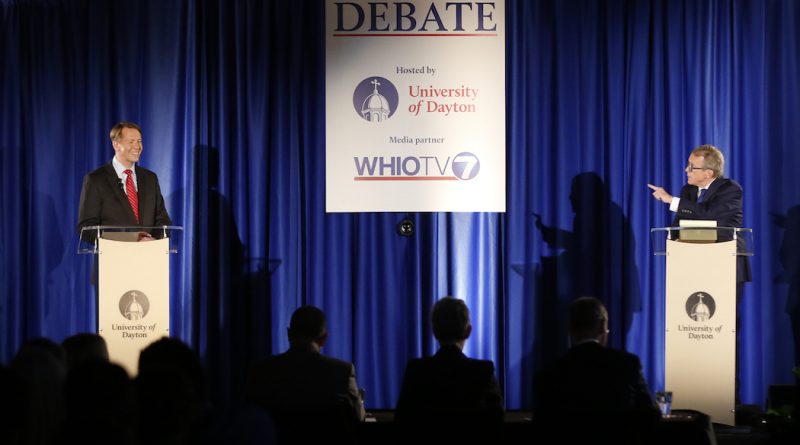UD Hosts Spirited First OH Gubernatorial Debate
Sean Newhouse and Emma Kapp
News Editor and Contributing Writer
UD hosted the first Ohio gubernatorial debate between Richard Cordray (D) and Attorney General Mike DeWine (R) Wednesday at its Daniel J. Curran Place at the River Campus.
Real Clear Politics has the contentious race at a close tie, declaring it a “toss up.”
Students got a chance to participate in the debate, including in its first question, which was asked by Jim Otte of WHIO-TV. He relayed a question from UD undergraduate Nicole Perkins about how the governor should handle the state’s opioid crisis.

The opioid epidemic, specifically Issue 1, was a frequently brought up topic in the debate. Issue 1, which will be on the Nov. 6 ballot, is a proposal to lessen drug crime sentencing. Cordray is in favor of it; DeWine is not.
Here is a useful explainer on the details of Issue 1.
Republican State Rep. Niraj J. Antani (city of Dayton’s state representative) said in an interview with Flyer News that he supports DeWine because he’s against Issue 1.
In a notable moment from the debate, Cordray compared taking DeWine’s advice on how to handle the opioid crisis to “trusting navigation to the captain of the Titanic.”

Political Science Professor Dr. Christopher Devine was one of the individuals chosen to ask questions during the debate. His colleagues, Drs. Nancy Miller and Daniel Birdsong, said they did not want to be him tonight.
“I would be really nervous about doing this,” Birdsong said. “I don’t envy that task.”
When asked if she was jealous, Miller responded, “Not jealous of him at all.”
Devine’s first question addressed student debt. Both candidates similarly stated the cost of college is too high and then proceeded to argue about Cordray’s handling of untested rape kits as Ohio Attorney General, which was brought up multiple times during the debate. However, the issue existed before Cordray’s tenure, and Cordray took steps to solve the issue before he was ousted from office, ironically, by DeWine. It also took DeWine several years to test the backlog of rape kits.
Other questions included gun control, abortion and marijuana legalization. DeWine said he was for putting mental health officers in every school and for fixing current gaps in gun law enforcement. Cordray supports universal background checks.
DeWine is pro-life; Cordray is pro-choice. Cordray said Ohio voters should decide if marijuana becomes legal. Dewine firmly came out against marijuana legalization.

In their opening and closing statements, respectively, Cordray and DeWine spoke about different visions for their potential governorship. Cordray, citing his experience as director of the Consumer Financial Protection Bureau, said he wants to work on behalf of those who are taken advantage of in society. DeWine, citing his experience in Ohio politics, said he wants to take Ohio “to the next level” with a focus on a bright future and the next generation.
The state economy was not a major topic in the debate. Jane Timken, chairwoman of the Ohio Republican party, described the economy as “issue number one” when asked by Flyer News which subjects the candidates should debate.
Timken also thanked UD College Republicans for their volunteer campaign work this year. College Republicans hosted its own viewing party in Adele Center and were visited by Mike DeWine and Jon Husted (‘89) after the debate.
Vote Everywhere sponsored a watch party at The Hangar for all students. Student volunteers for the debate were invited to a watch party at Curran Place where media could interview them. Cordray and Dayton Mayor Nan Whaley (‘98) came after the debate to talk and take pictures with those students.

Students were thankful for the opportunity to view the debate, but could not agree on exactly who the winner was.
“I think Richard Cordray won tonight’s debate,” said senior political science major Nora Walsh. “Mike DeWine spent a lot of time criticizing Cordray, but I think both did a lot of fighting. Voters probably wanted to hear more about policy views.”
“DeWine won the debate, in my opinion,” said SGA vice president Erica Szczechowski. “He aligns more with my ideals, but Cordray also did a wonderful job.”

Although the first debate was thorough, a few issues were not covered.
“A question on immigration is something I wanted to hear, but I did feel like they hit on enough diverse topics,” said Mayra Baeza, a senior studying sociology.
Overall, the excitement surrounding the debate showed how important it is for college students to be involved in state politics.
“Having an event on campus automatically increases people’s interest in issues,” said Vote Everywhere ambassador Anna Rose Redgate. “With the help of voter education, it helps people feel connected to issues.”

President Eric Spina also expressed excitement about UD hosting the debate.
“This is a remarkable opportunity to showcase the University of Dayton,” Spina said. “The learning experiences for our students and the opportunity to provide a venue for civil discourse about issues facing our state are immensely important to us.”
Earlier in the evening, yard signs supporting DeWine/Husted were put up in the student neighborhood. University political activities policy does not allow this.
DeWine announced in the spin room after the debate that he was expecting another grandchild.
Moderator James Brown reminded viewers Oct. 9 is the last day to register to vote. UD students can find voting information at my.VoteEverywhere.org.
Featured photo and third article photo courtesy of Ty Greenlees/Staff Photographer for Cox Media Group. All other photos courtesy of Christian Cubacub/FN Digital Media Editor.

